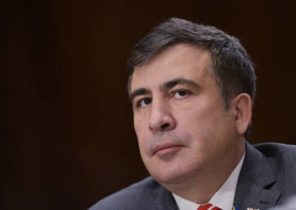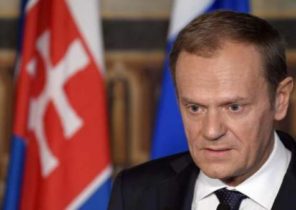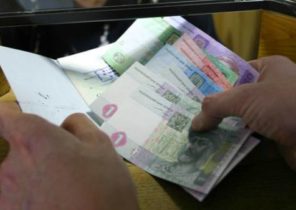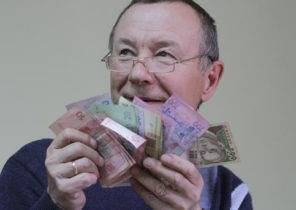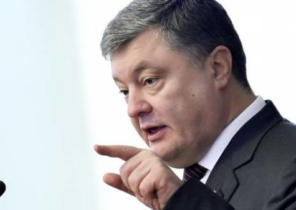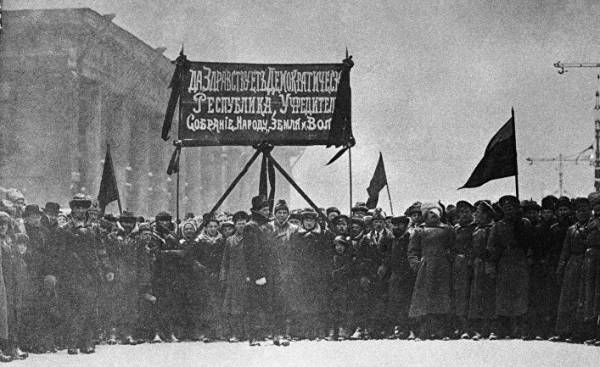
“February 23 the morning was at the factories the workers of the Vyborg district gradually began to cease and the crowd to go out, protest and dissatisfaction with the lack of bread, which was particularly felt in called factory district, where, according to the observations of the local police, in recent days, many people absolutely could not get bread.” Looked into report of secret police agents first day of the revolution, forever changed Russia, March 8 (23 February old style) 1917.
Unrest in Petrograd, which confused the tsarist regime failed to suppress the abdication of Nicholas II March 2 (15) to the Bottom station near Pskov, the establishment of a Provisional government — the memoirs of contemporaries, the rapidity of the revolutionary events did not allow to understand, where, in fact, so famously rushed Russia and who will ultimately benefit from these changes. The fact that less than a year will be victorious Bolsheviks, the radical faction of the social Democrats, who were still on the roadside of the Russian policy in February 1917 could not predict one, not excluding themselves Bolshevik leaders.
But a huge thirst for social justice was visible from the beginning of the revolution. Russia was very left the country: in the turbulent months that followed the fall of the monarchy, it appeared that sympathy for socialist ideas in one form or another is experiencing the absolute majority of citizens. This was reflected in the results of last autumn when the collapse and anarchy on the front and in the rear was already evident, the first in the history of Russia free elections to the Constituent Assembly, which was supposed to determine further ways of development of the country. A convincing victory on elections was won by the socialist-revolutionaries (SRS) — the party that consistently, not stopping short of violence and blood, fought against the monarchy of the Romanovs, but in 1917, were inclined to peace, though radical reforms — especially land reform.
If the country managed to slip between the threat of dictatorship emanating from the left, from the Bolsheviks and to the right, from the radical counter-revolutionaries, social revolutionaries probably some time would the ruling party of post-revolutionary Russia, the doctor of historical Sciences, Professor, Institute of social science, Ranepa, head of the permanent workshop “the Left in Russia: history and public memory” Konstantin Morozov. In an interview with Radio Liberty he thinks about why this happened and what was the essence of revolutionary Russia.
Radio Liberty: what the condition of the Party of socialists-revolutionaries came to the Feb?
Konstantin Morozov: I would say that the party was in the organizational condition of the sparseness. A significant portion of its prominent leaders were in exile, the other part — in prisons, in exile, at hard labor. She had to recover from scratch, this recovery was mainly the socialist party of 1905-07 that have moved away from revolutionary activity, but in March of 1917, in fact, returned to the party. They created all of its new cell. There were serious problems among the SRS and in connection with internal schisms, particularly due to the presence of different points of view on the war. In March, the SRS begins to reconstitute themselves as a single party, then at the III party Congress in may-June was held in life is, in my opinion, was a mistake. Because of disagreements within the party were such that it exist and govern themselves, make decisions as a single party could not. Immediately began the factional struggle and, accordingly, this resulted in the disintegration and the inability to conduct a unified party line in 1917.
— SRS for the first phase of its history, been associated in the public mind with violence and terror, from which they in 1917 have long departed. What was the opinion of the socialist-revolutionaries, their leaders on violence as the principle of the struggle for political power? Still, the terrorist baggage of the past will not go away, Victor Chernov and other party leaders. As they looked at it in 1917?
— The issue of terror in the SR party debated throughout its existence. I must say that at first, such figures as Mikhail gots and Viktor Chernov, who advocated the inclusion of terror in the tactics of the party, managed to insist on. But then among the revolutionaries were the people who advocated mass party, to focus not on terror, and propaganda and agitation among the peasantry and the proletariat. Generally their ideal was a mass socialist party, parliamentary, like a model party of the Second international, the German social-democracy. Further — more. During the revolution in the activities of the fighting brigades of the grass-roots party organizations are the wave of expropriation and a lot of this that the leaders of the party called “revolutionary hooliganism” after years 1909-11, after the exposure of yevno azev, the voices of those who say they need to renounce terror, are becoming stronger. By February of 1917, about any terror speech was not the last terrorist act was committed by the revolutionaries in 1911, then the terror on their part actually vanishes. Terrorist moods in the SR party are resurrected only after the October revolution of 1917 and especially after the dissolution by the Bolsheviks of the Constituent Assembly. But then most of the SR leadership opposed the use of terror against the Bolsheviks. This part of the revolutionary leadership thought that we need first to attract the masses to their side, act in ways mass political party.
You may recall that Boris Savinkov in his memoirs, quoted by Ivan kalyayev, his friend, a member of the SR Combat organization, who killed Grand Duke Sergei Alexandrovich. Kalyaev said SR without bombs — not SR. But in reality most of the socialist terror was not engaged, they Kalyaev this statement was disagree. It can be argued that the use of terrorist tactics has caused great damage to the SR party as the party who wanted to be a mass socialist party, who wanted to do the will of “all working class” Russia (where the SRS included the proletariat, the working peasantry and working intelligentsia) and the proposed evolutionary and democratic way of development. The political essence of the socialist revolutionary party, of course, is not a terrorist tactic that 1911 almost disappears completely, and the fact that they were able to offer such a program, including agrarian and federalist, which drew to them the sympathy of millions of people. By the autumn of 1917, the ranks of the Party of socialist revolutionaries was more than a million people, and the Bolsheviks — only 350 thousand. And most importantly — the social revolutionaries won the elections to the Constituent Assembly.
So, for the socialist-revolutionaries in 1917 — is flourishing: one million members, the electoral victory in the Constituent Assembly. Why is it all of them eventually failed to use? Why it happened so, that the socialist-revolutionaries, despite this popularity, ceded power to the Bolsheviks, and then, despite all attempts? What contributed to their failure?
— There are two sets of reasons — objective and subjective, that is, the errors themselves SRS. In my opinion, that’s what’s crucial: to lead the democratic transformation in the conditions of world war — an extremely difficult task. What revolution occurred during the war, is largely determined the whole future course of events. What a world war? On the one hand, this decline in quality of life and exacerbation of all social contradictions that had been accumulating for decades. And on the other hand, the millions of people who get a habit to kill. This change is very serious in psychology. Bitterness to the limit combined with the compressed spring social expectations. These expectations have accumulated to such an extent that in 1917, many wanted to get everything at once. For example, workers were not satisfied that they have trade unions, which are the same socialists are going to meet. Workers wanted more worker control of factories. In practice, the same Mensheviks and social revolutionaries to do so could not, because this would lead to serious problems with the handling companies. And the peasants wanted to immediately land.
Here we come to the errors that were made by the SRS. It was impossible to delay the convening of a Constituent Assembly. More precisely, there was no need to go on about the liberals, the cadets in the Provisional government, which strongly delayed the Constituent Assembly. The liberals realized that the left party is stronger, the left will have a majority in the Constituent Assembly and as a result, the peasantry and the proletariat will get much of what they demanded. So cadets delayed Constituent Assembly. It was very large, serious mistake.
— A subjective factor played a role in that SRS failed? Look closely: on the one hand, a party that has positioned itself as the party “land and freedom”, based on the peasantry, and on the other — most of the revolutionary leaders — the figures are quite urban and intellectuals, not the people “from the plow”. This contradiction played a role in that for SRS people, of course, gone, but not to the same extent, to provide them with political power?
— Everything is much more interesting. Program of socialization of the land, which was proposed by the socialist-revolutionaries, not because the sky fell. This was the result of very serious work of the populist economists and sociologists. It is a kind of revenge, if you like, for the failure of “going to the people” in 1874. After that populist economists, sociologists, statisticians are beginning to seriously explore the real peasant life, and in 20-30 years it comes to understanding the lives of the Russian peasants are and what it wants. It is on this basis, the socialist party and creates its program the socialisation of the land. Moreover, for SRS characterized by the fact that not very characteristic of the Russian intelligentsia, which is often preferred to resonantcavity and their values just to impose. Revolutionaries have always tried to maintain feedback with the peasantry. I came across a very interesting document, a kind of questionnaire that was launched, the Central Committee of the socialist-revolutionaries in 1906 or 1907 at the designated organizations, so they conducted a kind of sociological survey: how are the peasants to the government, the army, to the priests, what they think about taxes, land use, how to distribute, how to manage it. Therefore, the socialist-revolutionary party and its programme, created by many years and many efforts, not by accident were perceived by the peasantry as their own. On the other hand, was quite powerful farming lobby in the SR party. The lower layer of activists and functionaries — the so-called national intelligentsia: paramedics, teachers, agronomists, surveyors, foresters, who, in fact, this relationship of the peasantry and the party and carried out.
The problem is that SRS is not carried out, did not take into account fully the interests of the peasantry in 1917. The revolutionary government was afraid to give land to the peasants, because, on the one hand, the military quartermasters said that immediately after the collapse of the supply of the army, and on the other there were fears that the soldiers, i.e. those peasants in greatcoats, immediately flee from the home front. Later, at the IV Congress of the party, Eugene Ratner, a member of the SR Central Committee, said it very well: they say, we for the sake of war, for the sake of the front had to compromise with bourgeois parties and are unable to protect class interests of the peasantry and workers, and this is our huge wine before history. According to Ratner, it was necessary immediately to convene a Constituent Assembly, for at least two or three months before, i.e. in August-September 1917, and to start agricultural transformation. Part of the SRS, it is necessary to tell, wanted, Chernov, for example, insisted on it. Was the idea of creating a socialist government — the socialist-revolutionary Central Committee, by the way, in September it was inclined to this option.
Socialist government was assumed, including all left-wing parties, including the Bolsheviks?
— There were two options. The first option is the left one and very adventurous — at least it so appeared to the SRS — invited Maria Spiridonova, saying that the SRS just needs to take power and create their own homogeneous revolutionary government.
— That is, to do what the Bolsheviks did in the end?
— Another thing is that the Bolsheviks immediately began to reshape their slogans and their actions. That is, they marched under the slogans, but after some time it all transformed completely to another. But if you go back to SRS, most of them advocated a coalition socialist government, including the Bolsheviks. And at some point after October 1917, there were negotiations between the Bolsheviks and socialist parties on the establishment of such a government, but personally without Lenin and Trotsky. And that Lenin in many respects this combination and broke. If it was a possible alternative, the creation of a socialist government, say, if this was agreed in September? I think so, Yes. Next would be the election of the Constituent Assembly, where the majority of the socialist party led the socialist-revolutionaries, the Bolsheviks had 25%, that is, it is the second largest faction. It is clear that they would have a significant impact, but such a course of events, however, gave the opportunity for the preservation of democracy and parliamentarism. It is clear that after some time, the socialist party would have lost power in those elections as we are seeing in Europe — swing, when the power then right, then left. There was then the chance to get such a scheme of regime change in democratic procedures through the Parliament. Because the authority of the Constituent Assembly was very high, he was selected for the first ever genuinely free elections.
— You have slightly touched on the period after the Bolshevik revolution. But going back a step. One of the key figures of 1917 — Alexander Kerensky. Than it was for SR and which ultimately played a role in the history of this party?
Very good question, but before to answer it, I would like to make one more General observation. You mentioned “the Bolshevik revolution”. On the one hand, the socialist — centrist and right — wing social revolutionaries themselves used this term. On the other, the left SRS, the anarchists later preferred the concept of a unified Russian revolution of 1917-1921 years. That is, a single revolutionary process, which has the February with the October, and then civil war. So about today, and say. Those who this concept is not accepted, believed that October is not a revolution, by its nature, because there was not a mass spontaneous movement. The Bolsheviks themselves, in principle, to the early 20’s, too, often talked about the coup, its a coup. But part of the SRS, for example, Marc vishniac, in my opinion, rightly observed that the events of October 1917 can be interpreted as a kind of “post revolution”, organized by the top. This symbiosis of the revolutionary process, with some features of the coup. When someone says just the coup is not quite right, because, of course, had the support of workers and soldiers. In addition, the word “revolution” displays on the analogy of military coups in, say, Latin-American type. But in any case, we must continue to comprehend the nature of those events conceptually.
— And if you go back to the figure of Kerensky?
— Kerensky for the leadership of the SR party was, of course, as they said, a fellow traveler. He was in the revolutionary movement during the revolution of 1905-07. Becoming a Deputy of the state Duma, attempted to unite various populist groups. On the other hand, among the SRS could exist basic feelings of envy towards him. Kerensky became one of the most popular people in Russia. Those revolutionaries, social revolutionaries, who for years fought in the underground and created the party, was on the sidelines, and he declared himself a socialist society in 1917 was seen as the main SR. From Chernova there is a very harsh assessment of Kerensky, in his opinion, he played very bad role for the SR party, because almost did not contact with the revolutionary leadership, directives of the Central Committee did not perceive. The right socialist-revolutionaries and the centre-right supported Kerensky, and the left tried to break up with him. At the III party Congress in may-June 1917 left to disrupt the elections of Kerensky in the Central Committee of the socialist revolutionary party. It’s just a ride. It was a real slap in the face.
— What does that prove? The SRS, unlike the Bolsheviks, autocratic party was not, while remaining a force more collectivist?
Democrats are generally less prone to warlordism, it is the SRS fully manifested. This does not mean that in the SR environment, there were people with a strong authoritarian streak. Another thing is that leaders need to adapt to the moods and notions of the revolutionary environment in the subculture of the Russian revolutionary movement. In the SR party ideas detsentralizm, initiative, independence from the center was very strong. They originally formed a kind of a collective leader, he was at different times from different people, usually there were three or four people. Plus it’s supposed to be about at least three-four age generations of SRS. The first generation is still the people, and the last generation coming to the party in 1923-24. That is, we have a rather complicated picture. But in General — Yes, a single leader was not. According to many historians and contemporaries this is one of the reasons for the failure of the social revolutionaries in 1917. Chernov believed that if they were alive gots and Gershuni, they would be three, including the mind, in 1917, would be able to be authoritative for the party. Gershuni was highly charismatic, even more than Lenin, and maybe he had a chance to keep the party under control. These hypotheses, on the one hand, have some meaning, but you need to consider the weakness and division within the party that existed at the time of the revolution, in particular, strong differences between the revolutionaries regarding the war. He Chernov, in the opinion of many, was a good theoretician, but not a leader, organizer. He, however, stood out for being able to reconcile different points of view, played the role of unifier. Those who disliked him called him the “universal patch”.
— If to try to summarize: whether SRS failed historical alternative to Bolshevism — or on a really critical role, given their looseness, eternal discord inside, SRS still had neither the strength nor the ideas nor the people?
— I think that the victory in the elections to the Constituent Assembly when they gained a majority and, in fact, took the first two laws, including the socialization of the land — this was the beginning of the realization of a democratic alternative, the SR alternative. Managed whether they would in this way to lead the country? I agree with the point of view of his German colleague Manfred Hildermeier, who in 1992 wrote in one of his articles that because one of the main problems Russia was a big gap between city and village, the SRS on the role of the party that expressed the interests of the peasantry, the proletariat and the intelligentsia, were good to a large extent. I would also add that it is not necessary to exaggerate purely Krestyanskoe the SR party. If you look at their program, they tried to join the European socialist concept with some pochvennicheskaya ideas. They said that the peasant is not worse skull skull proletarian and intellectual, and it is suitable for making the ideas of socialism. It was one of the first attempts to combine the values of European society and the idea of modernization with traditional values of society, a considerable part of Russian peasantry — the peasantry as painlessly as possible joined the new society. SRS meant that for many decades, the development will go in a bourgeois way, will the market economy, socialism will come very soon. They are in this sense were evolutionists. They actually first proposed the idea that the world is now a very fashionable. Is the idea of peripheral capitalism, whereby capitalism in developed countries and in the countries of the second and third tier quite different. In the countries of peripheral capitalism, including in Russia, it manifests their most predatory traits, it is the most destructive.
SRS also believed that the Russian people, of course, democracy is adapted, moreover, they thought that Russian traditions will, of communal self-government give the opportunity for the finest development of democracy as such. The SRS would reopen the collectivist democratic potential. They did not idealize the peasant commune, by the way, considering that she needs to transform. They relied on co-operation, which in the early twentieth century in Russia has developed very powerfully. And all of it was under the ideological leadership of the SRS. They believed that it is necessary to rely on the labor farm, then we will be able to modernize the country and eventually take the path of socialist development. The main thing is that, despite some of the utopianism of their views, the social revolutionaries, of course, was able to evolve. Another important thing: the socialist party more than other parties approached for the role of a platform for the coordination of different interests. It’s actually the path that followed the European social-democracy. However, an important feature was the looseness of the party, torn inside of her. In my opinion, the SR party sooner or later would split into several parties. If we talk about a democratic revolutionary alternative, then leaving out the SR-maximalists and left SRS. They, unlike the rest of the SRS cannot be considered adherents of democratic socialism. This term, by the way, the SRS and the Mensheviks is very actively used with the 20-ies. Later, in the mid-20th century, European socialist parties also speak about the values of democratic socialism. From this point of view of the socialist-revolutionaries and Mensheviks — this, of course, the representatives of democratic socialism that created the socialist international, says historian Konstantin Morozov.
The end of the SR party was tragic. During the civil war the socialist-revolutionaries finally split. The right socialist-revolutionaries participated in the anti-Bolshevik movement, leftists were inclined to cooperate with the Bolsheviks. However, in the summer of 1918, finally convinced that Lenin and his entourage lead Russia to the dictatorship, the left socialist revolutionaries made an unsuccessful attempt to overthrow “commissarocracy” as analogous with the autocracy they called the power of the Communists. In 20 years the party was finally finished in summer of 1922, the SR leaders 12 special process was sentenced to death. The execution, however, was postponed, turning prisoners into hostages, if the remains of the SR party decides to return to the methods of terror, now against the Communist government. One of the SR leaders, Eugene Ratner, was kept in prison together with a young son, she complained to Dzerzhinsky. Subsequently, the shot was replaced by the socialist-revolutionaries convicted of various sentences and a link. The most prominent revolutionary figures who stayed in Russia, became victims of Stalinist repression. A number of former revolutionaries, including Maria Spiridonova and her husband Ilya Mayorov, was among the executed in Medvedevsky forest near Orel in September 1941.
